Vietnam Customs for Travelers: Key Culture Tips You Should Know
- Updated: July 19, 2025 Celeste in Beautiful Vietnam, Vietnam Travel Tips 0 comment.
Discover essential cultural tips for travelers to Vietnam, from etiquette to local customs, to ensure respectful enriching experiences and smooth interactions throughout your journey
Greetings and Communication
Understanding local customs is essential before exploring Vietnam. When meeting locals, a respectful greeting – such as a gentle nod or slight bow – is often appreciated. In more formal or professional settings, handshakes are common and usually paired with a subtle bow, especially when greeting elders. Avoid hugging or kissing, as these gestures are typically reserved for close friends and family.
Vietnamese language reflects age and social status, so people often use respectful titles like anh (older brother), chi (older sister), or bac (uncle or aunt) when addressing others. These terms express politeness and cultural awareness, helping travelers build trust and connect more easily with locals.
Learning a few basic Vietnamese phrases – such as “hello” or “thank you” – is seen as a thoughtful gesture. Even simple efforts can show interest and respect, making your interactions warmer and more engaging.
For travelers on their Vietnam tours, understanding these communication customs can lead to a smoother, more meaningful journey filled with genuine cultural connections.
Dress Code and Modesty
Vietnam customs for travelers include understanding local dress codes and behaviors, especially outside busy tourist areas. Vietnamese people tend to dress modestly in daily life. Therefore, it’s best to avoid revealing clothing in public places. When visiting rural areas or Buddhist pagodas in Vietnam, covering your shoulders and knees is not just polite but expected. Moreover, while swimsuits and shorts are perfectly acceptable at the beach, they are not appropriate in towns or temples. Wearing them in the wrong setting may seem disrespectful to local norms. So, always carry a light scarf or long pants when heading out.
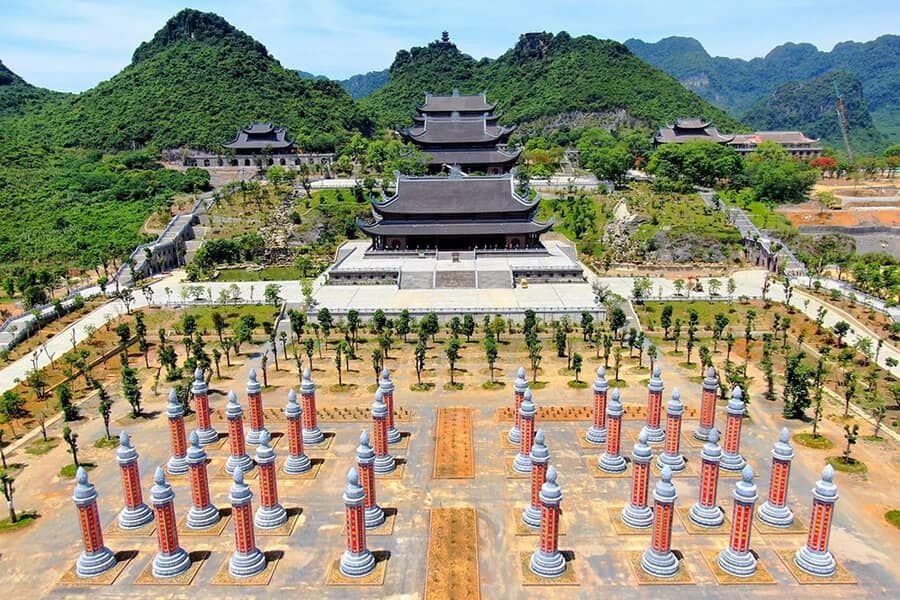
Discover Vietnam customs for travelers at the sacred Tam Chuc Pagoda sanctuary
In addition, another common practice involves removing shoes before entering homes. This also applies to some indoor spaces such as spiritual sites, certain cafes or guesthouses. You will often see a row of shoes at the door as a clear sign. Therefore, paying attention to these habits helps you blend in respectfully. Locals appreciate visitors who observe basic traditions. These actions may seem small but they reflect your understanding of the culture. Being mindful of appearance and manners makes your experience smoother and more welcome in every part of Vietnam.
Temple and Pagoda Etiquette
Vietnam customs for travelers include showing deep respect for the country’s rich spiritual life. Religion is closely tied to daily habits. Therefore, when visiting temples or spiritual sites, always act with quiet respect. Speak softly, keep your phone silent and avoid flash photography inside sacred areas. Never point your feet toward the altar, as this is considered rude. Sit with your feet tucked or kneel if unsure. Also, give space to monks or anyone who is praying. Do not walk in front of them or interrupt rituals in progress.
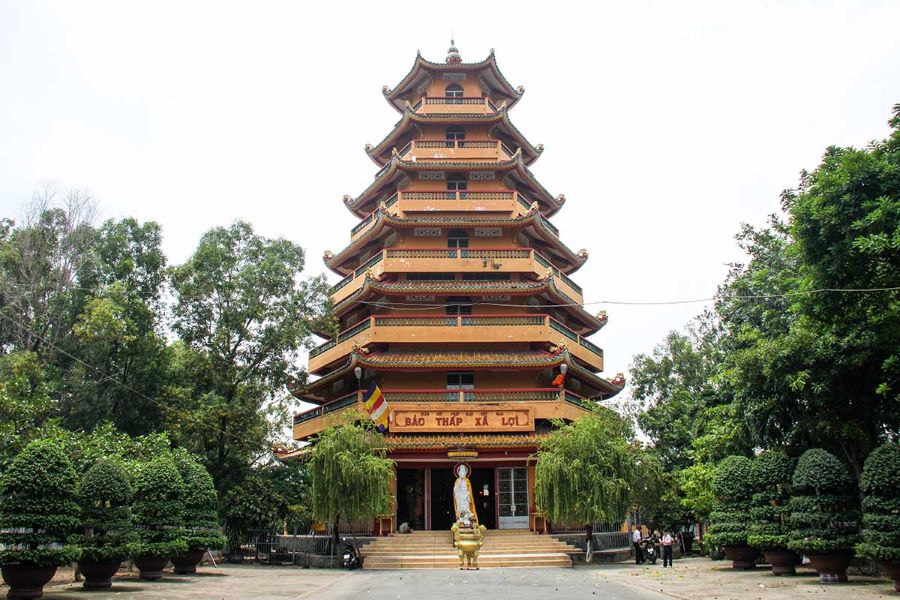
Vietnam customs for travelers shine through vibrant rituals at Cao Dai Temple daily
In addition, offering incense is a meaningful gesture. However, follow locals and avoid lighting large bundles. One or two sticks are enough and more respectful. Donations at the altar are appreciated but never forced. You may offer quietly without seeking attention. Moreover, always walk clockwise around statues or shrines. When exiting, try not to turn your back directly to sacred images. Instead, take a respectful step back before turning. By observing these simple but important habits, you show deep appreciation for Vietnamese values. These respectful gestures may be small but they reflect your understanding of the local culture and earn you quiet admiration.
Suggestion two temples, pagoda in Vietnam
🏞️ Perfume Pagoda – near Hanoi
📍 My Duc District, ~60 km from Hanoi
🕒 Best time: Feb–Apr (festival season)
⚠️ Tip: Go early, take boat + cable car, wear comfy shoes
🕌 Thien Mu Pagoda – Hue
📍 Hue City, by Perfume River
🕒 Best time: Mar–Aug (dry season)
⚠️ Tip: Visit at sunset, dress modestly, try river boat
Dining Etiquette
Vietnam customs for travelers include learning the proper way to enjoy Vietnamese cuisine. One of the best parts of traveling is exploring new foods. However, dining in Vietnam comes with unspoken traditions that reflect community values and deep respect. Meals are usually shared among everyone at the table. Dishes are placed in the center, allowing each person to serve themselves. It is polite to wait for the eldest person to begin before you start eating. This shows good manners and honors their position.
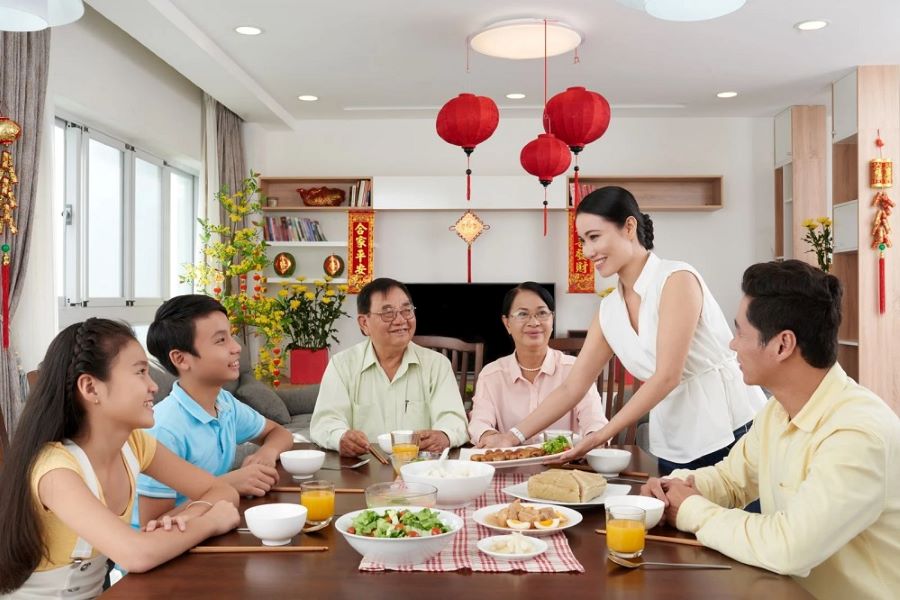
Master Vietnam customs for travelers by observing traditional Vietnamese table manners during dining.
In addition, chopstick etiquette is taken seriously. Never stick chopsticks upright in a bowl of rice, as it resembles funeral offerings. Also, avoid pointing them directly at others or using them to gesture. Moreover, when invited to someone’s home, it is respectful to say “moi” (invite) before you begin your meal. This simple word carries warmth and politeness. It shows appreciation for the meal and respect for your host. By following these simple behaviors, you will enjoy richer dining experiences. Small gestures can make a big difference. Respect for table manners is another way to connect with the culture and earn the hospitality of the people you meet.
Gift Giving and Hospitality
Vietnam customs for travelers highlight the importance of recognizing and respecting the country’s strong tradition of hospitality. Vietnamese people are known for being incredibly welcoming to guests. If you’re invited into someone’s home, bringing a small gift is a thoughtful gesture. You can bring fruit, sweets or a Vietnam souvenir from your country. However, avoid gifts in black or yellow wrapping. These colors are linked to mourning and may unintentionally cause discomfort. Instead, choose something with bright or cheerful colors to show your kind intentions. Upon arrival, it’s common to be offered tea or snacks. Even if you’re not hungry, accepting the offer politely is a way to show appreciation. Refusing may come across as unfriendly or impolite in some situations.
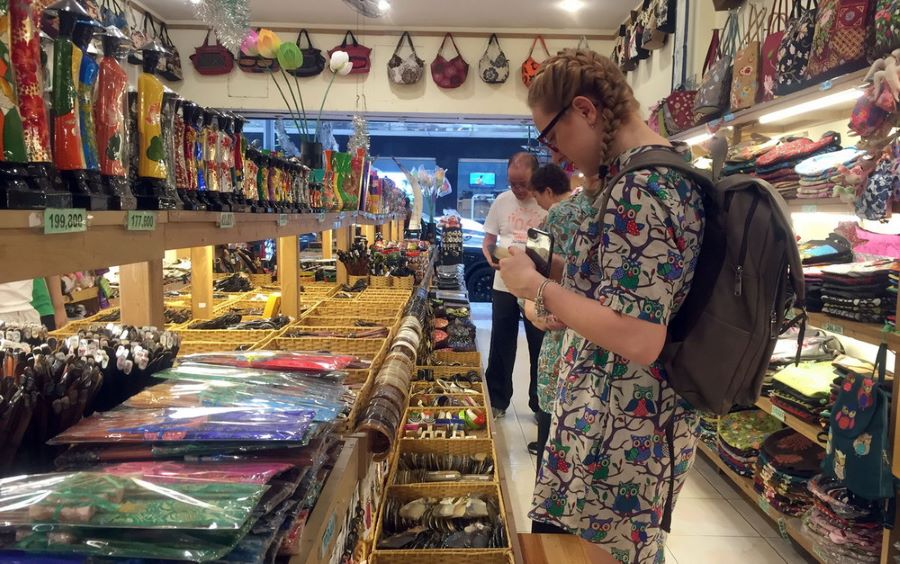
Vietnam customs for travelers include choosing meaningful Vietnamese souvenirs with cultural value
Furthermore, it is good manners to compliment the host’s home or cooking. A sincere comment can go a long way in building warmth and mutual respect. These small acts are simple but meaningful. By understanding these traditions, you’ll likely be welcomed with open arms. Respecting local customs helps create genuine connections. Thoughtful behavior is always remembered and reflects your care for the culture and people you meet.
Public Behavior
Vietnam customs for travelers emphasize the importance of staying calm and composed in public settings. In Vietnamese culture, emotional control is seen as a sign of respect and maturity. Therefore, using loud voices, showing anger or starting arguments in public is considered highly inappropriate. These actions are viewed as a serious loss of face, which can harm your reputation and upset others nearby. In contrast, maintaining a peaceful demeanor helps build trust with the locals. Even during misunderstandings, people expect you to remain polite and collected. This not only avoids conflict but also reflects a deep understanding of local values.
Furthermore, avoid public displays of affection like hugging or kissing. These are uncommon in Vietnam and may draw uncomfortable attention. Instead, use a gentle smile or friendly eye contact to express warmth. If you need assistance, approach someone kindly. Most locals are happy to help when treated with respect. Speaking softly and using positive body language goes a long way. Also, a simple smile can defuse many situations. It often bridges language gaps and eases tension. By practicing calm and respectful behavior, you enhance your travel experience while honoring cultural expectations. This thoughtful approach leaves a positive impression everywhere you go.
Tipping and Money Etiquette
Vietnam customs for travelers include understanding the subtle rules around tipping and money etiquette. While tipping is not mandatory in Vietnam, it is increasingly appreciated in many tourist services. At places like restaurants, taxis or spas, a tip of 5–10% is considered generous and thoughtful. Though not expected, it reflects your gratitude for good service. In addition, how you give money matters as much as how much you give. When handing over cash, it is polite to use both hands. This gesture shows respect, especially when interacting with elders or vendors in traditional settings. Using both hands also signals that you are giving with care and sincerity.
Moreover, avoid tossing or sliding money across a counter. That can be seen as disrespectful. Instead, hand it over gently and maintain a polite demeanor. These small actions reflect cultural understanding and are always noticed. Also, while large tips are not necessary, even small coins or bills can be appreciated with a warm thank you. By following these simple habits, you create positive interactions and support local workers. Respectful behavior with money deepens cultural connections and enhances your overall experience in Vietnam.
Superstitions and Beliefs
Many Vietnamese follow spiritual practices alongside Buddhism or traditional folk religions. These customs shape daily life and local values. Travelers may see small altars in homes, shops or even hotel lobbies. These are used for ancestor worship and should never be touched or disturbed. In Vietnam, respect for the spiritual world is deeply rooted. Therefore, always observe your surroundings and act with awareness. Taking photos in sacred spaces is often discouraged unless you ask for permission first. Moreover, the number 4 is considered unlucky because it sounds like “death” in Sino-Vietnamese. Avoid giving gifts in sets of four. This small gesture shows cultural sensitivity and thoughtfulness.
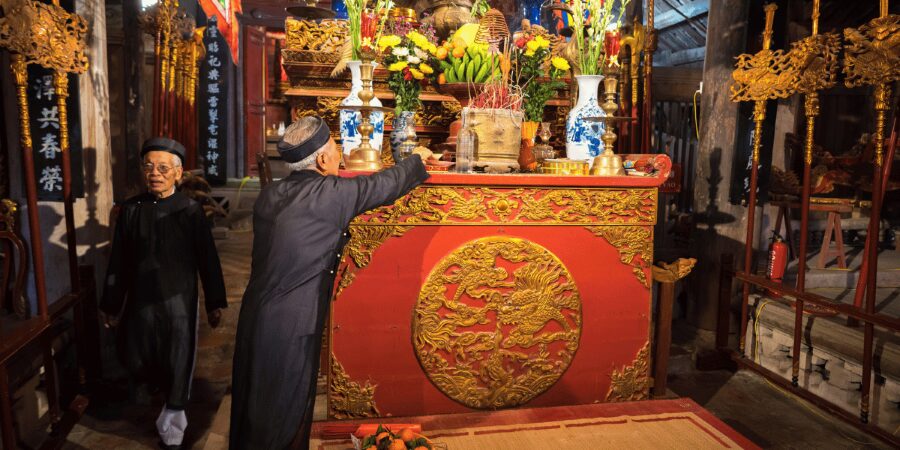
Discover Vietnam customs for travelers through daily ancestor worship and sacred home altars
Additionally, dress modestly when visiting pagodas or temples. Shorts or sleeveless tops may not be allowed in sacred areas. Always remove your shoes before entering religious buildings. As a traveler, learning local etiquette enhances your experience. By being mindful of these customs, you show respect and build genuine connections. Understanding Vietnam customs for travelers helps avoid unintentional disrespect. It also enriches your visit in meaningful ways. So stay observant, ask politely when unsure and appreciate the deep traditions that shape Vietnam’s cultural identity.
Tips for Traveling with Kids
For families who plan to Travel Vietnam with kids, the experience can be both joyful and enriching. The good news is that children are welcomed almost everywhere. Locals are often happy to see young travelers and may offer friendly smiles or small gifts. Restaurants, temples and even busy markets are generally kid-friendly environments. Still, staying prepared is important for a smooth journey. In cities like Hanoi or Ho Chi Minh City, scooters fill the roads and move unpredictably. Always hold hands and use crosswalks when available. Vietnam’s tropical climate can be intense, especially between April and August. Prioritize hydration and carry water throughout the day. Sun hats, sunscreen and light clothing help protect against heat and sunburn. A small medical kit with essentials is useful, as some pharmacies may not stock your usual child-specific items. Snacks and wet wipes also come in handy during travel days.
🏨 Family-Friendly Places to Stay
📍 Hanoi: Hanoi La Siesta Hotel – Comfortable rooms and helpful staff. Best visited from October to April.
📍 Hoi An: Green Village Homestay – Garden space and quiet setting. Ideal from February to April.
📍 Da Lat: Zen Valley Dalat Resort – Cool climate and nature views. Great between November and March.
🎒 Always book early during holidays and ask for extra bedding. A calm pace keeps the journey smooth and enjoyable.
General Safety and Travel Tips
Whether you’re exploring cities or peaceful countryside, smart habits can make your trip easier and more enjoyable. These safety tips are especially helpful for families who plan to Travel Vietnam with kids.
• Protect belongings in busy places like markets or tourist spots. Use bags that zip and keep them close.
• Only use official taxis or trusted ride apps such as Grab. Avoid random drivers on the street.
• Always carry a copy of your passport and visa. Keep originals in a hotel safe if possible.
• Stick to bottled water especially in rural areas. Avoid ice unless you know it’s from a clean source.
• Be aware of tourist scams near popular sights. Watch for inflated prices or unlicensed guides.
• Teach kids to stay close in crowds. Hold hands in traffic-heavy areas like Hanoi or Ho Chi Minh City.
• Focus Tip: Always keep your passport secure and avoid showing off cash, phones or jewelry in public.
• Choose accommodations with good reviews and family-friendly features like extra beds or quiet locations.
🌏 Final Thoughts
Vietnam is a land of warmth and deep cultural identity shaped by centuries of tradition and community spirit. Whether in cities or small villages, showing respect for local customs creates meaningful travel experiences. When visiting Temples in Vietnam, dress modestly and act with quiet respect. Always remove shoes before entering sacred spaces. Food also plays a central role in Vietnamese life. Exploring Vietnamese Cuisine means discovering balance, freshness and local pride in every dish. Moreover, learn a few basic phrases in Vietnamese to show politeness and interest. A simple greeting can lead to a friendly smile. Avoid loud behavior in spiritual or family settings. Instead, observe how locals behave and follow their lead. Traveling with patience opens the door to genuine connections and local kindness. Always ask before taking photos, especially in rural or religious settings. Respect and curiosity are the best tools for exploring Vietnam with care and appreciation.
Start planning your tailor-made Vietnam tour by contacting one of our specialists…
Celeste
My name is Chi but you can call me Celeste. I was born in Haiphong, the dynamic port city lying 100 km to the east of Hanoi, and also the gateway to Ha Long Bay and Cat Ba Island. I graduated from Hanoi University, majoring in Hispanic Language and Culture. I have passion for traveling and I love planning my own trip myself following my own interest. I’m willing to help others visitors to make their own dream trip to my charming country and make them feel at home.







